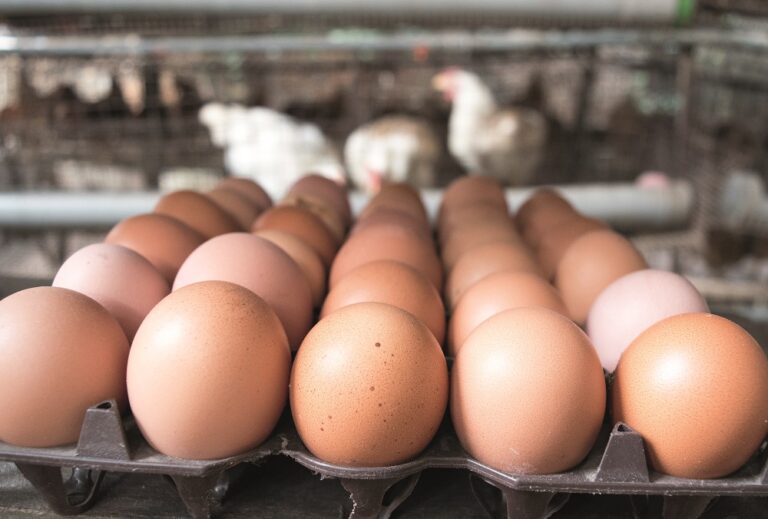Pressures are piling on poultry producers. A worrying percentage are planning to leave the industry.
Producers of British eggs and poultry meat face an uncertain future without greater government support and supply chain reform, the NFU has said, following a survey of its poultry members.
The survey looked at the impact of the past two years on poultry production and farmers’ intentions over the next two years. It found that 24% of egg producers and 15% of chicken meat producers were either unlikely or unsure if they would still be producing poultry beyond November 2025. The main reason cited for this was insufficient returns which suggests businesses have not been profitable.
The survey also highlighted some of the key concerns for both sectors, including:
The risk of avian influenza (94% of egg producers and 92% of chicken meat producers were fairly or very concerned)
The lack of fairness in the supply chain (90% of egg producers and 76% of chicken meat producers were fairly or very concerned)
High energy prices (92% of egg producers and 61% of chicken meat producers were fairly or very concerned)
Being undercut by imports (90% of egg producers and 78% of chicken meat producers were fairly or very concerned)
In order to better support the production of British eggs and poultry meat, the NFU said there should be greater fairness in poultry supply chains, for poultry producers to be included in the Energy Intensive Industries scheme, and for a long-term strategy from government to be set ahead of any future outbreaks of avian influenza (AI).
NFU poultry board chair James Mottershead said: “British eggs and poultry meat are staple parts of so many people’s diets, but the sector is under a huge amount of strain. Incredibly volatile production costs and the threat of avian influenza have put producers under extreme pressure.
“The sector urgently needs support, certainty and fairness applied across the supply chain if it is to remain strong in its production of quality, safe, nutritious and sustainably produced poultry meat and eggs which we know the vast majority of the British public rely on.
“That’s why the NFU is calling for change within poultry supply chains to ensure a fairer sharing of risk and reward, as outlined in our response to the government’s recent review of the egg supply chain.
“This survey has also highlighted the ongoing threat from avian influenza that poultry farmers and their flocks continue to face. While the number of outbreaks has been minimal this winter compared to previous years, the devastating impact the disease has on farming families is keenly felt across the sector. It is important not to take our eyes of the ball and we wait in anticipation for the government to publish the recommendations from the AI Vaccination Taskforce so that informed decisions can be made to protect the national flock.”
No investment
Both the egg and poultry meat sectors are holding back on investing in their businesses, according to the survey.
The work found that a third (31%) of broiler producers had no plans to invest in their business during the next two years, while 29% of laying hen producers had not invested for the past two years and 33% had no plans to invest going forward.
Those that have invested have done so by supporting staff wages, training and improved equipment. Insufficient returns were blamed by the majority of producers as the reason for remaining cautious.
Rising input costs were a problem, with energy prices (46%) and feed prices (28%) being of major concern to poultry producers. Increases in the broiler sector showed feed up 31%, electricity 41%, labour 20% and chicks 13%. In the laying hen sector feed was up 31%, electricity 35%, labour 22% and pullets 23%.
Fewer turkey producers took part in the survey, but their responses seem to suggest that no enterprises are staying the same – they are either growing or getting smaller.
Broiler producers
When comparing production levels to two years ago, 31% of broiler producers now have a lower level of production. The main reason for those decreasing production was reduced stocking density or a change in production system (65%) and insufficient returns (42%).
Some producers have switched production systems to meet the Better Chicken Commitment criteria, or to new standards set by retailers, which have often resulted in lower stocking density.
Over 70% of boiler producer respondents said they had a written and signed contract in place, with the rest either having a written but unsigned contract, a verbal contract or no contract at all.
Layers
In comparison to two years ago, almost a quarter (24%) of producers now have a lower level of production. The main reason for those decreasing production was insufficient returns (76%).
12% of producers surveyed stated they are unlikely to still be producing eggs by November 2025, whilst a further 12% were unsure.
65% of egg producers surveyed said they had a written and signed contract in place. 21% have no contract in place at all.


